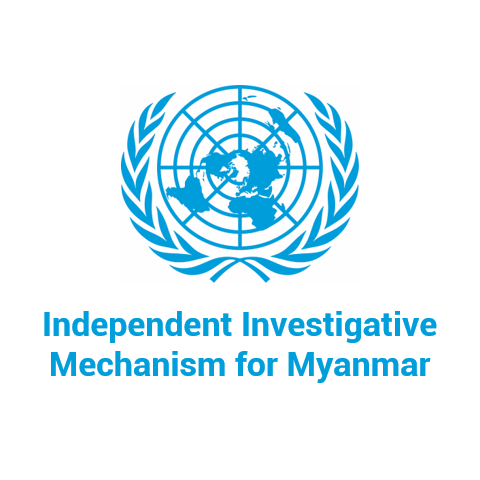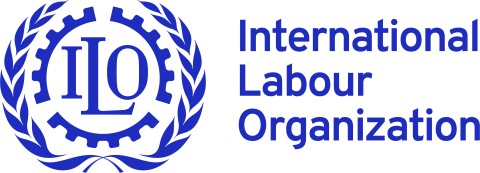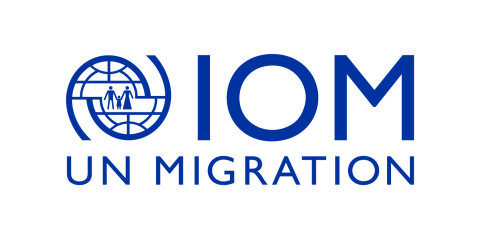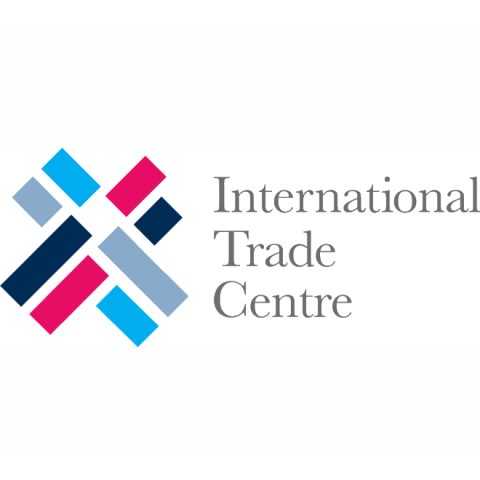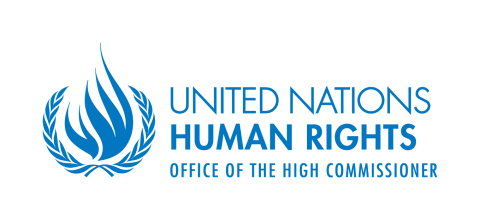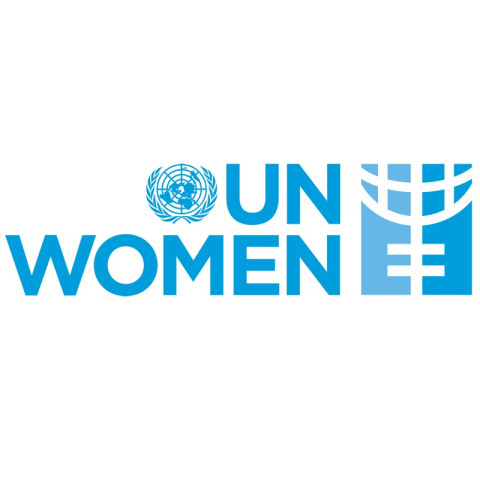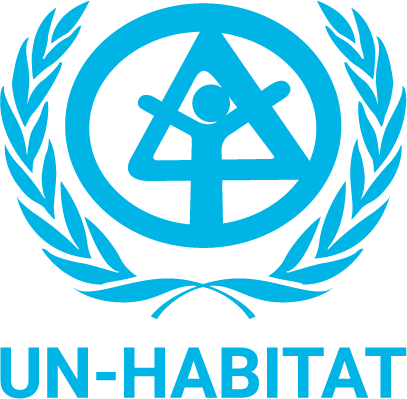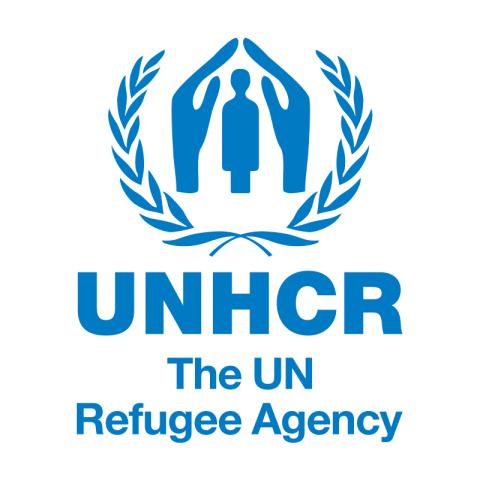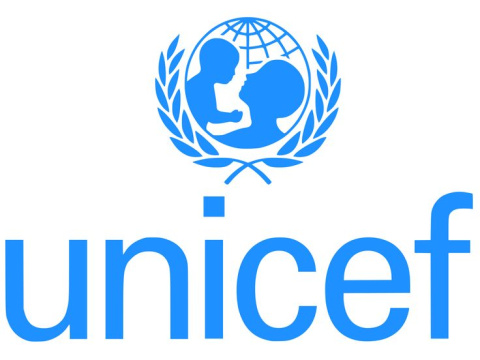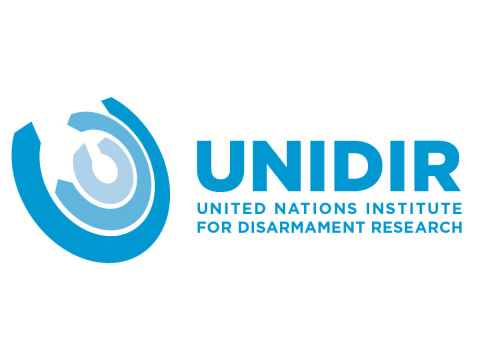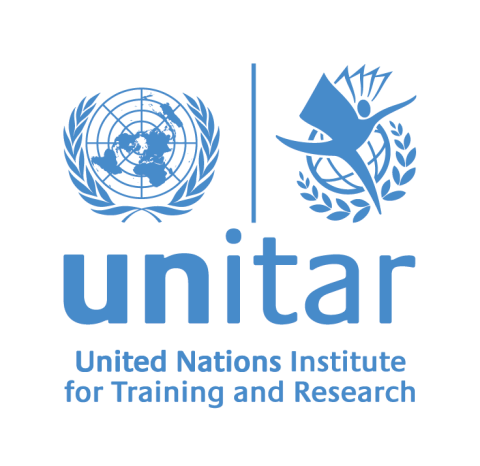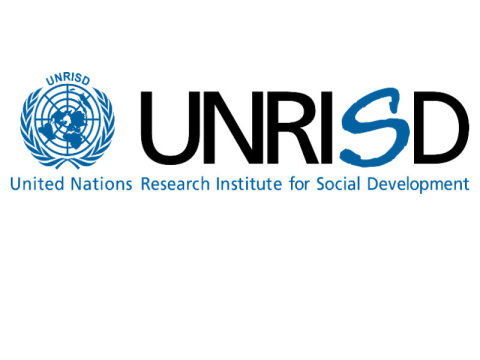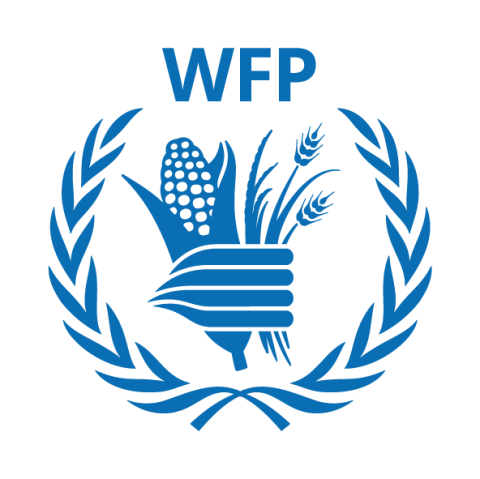
Breadcrumb
- تمت ترجمة هذه الصفحة باستخدام الترجمة الآلية. اقرأ المزيد.
تعريف حقوق الإنسان
الإعلان العالمي لحقوق الإنسان (1948)
تُمثّل المواد الثلاثون المُدوّنة في الإعلان العالمي لحقوق الإنسان أول اتفاقية دولية على الإطلاق تُعنى بحقوق الناس وحرياتهم. وهي تمتد من أبسطها، الحق في الحياة، إلى الحق في عدم التمييز والمساواة في المعاملة، وحالات أكثر تحديدًا، مثل الحق في الحماية المتساوية أمام القانون، والحق في الترفيه، والحق في حرية التنقل داخل البلاد وخارجها.
الإعلان بحد ذاته ليس وثيقةً مُلزمةً قانونًا، بل التزامٌ مشتركٌ للدول. بل على العكس، ألهم أكثر من 80 معاهدةً دوليةً لحقوق الإنسان.
العهود الدولية (1966)
يُفصّل العهد الدولي الخاص بالحقوق الاقتصادية والاجتماعية والثقافية والعهد الدولي الخاص بالحقوق المدنية والسياسية العديد من المفاهيم التي سبق أن تناولها الإعلان العالمي لحقوق الإنسان. وهما مُلزمان للدول التي صدّقت عليهما ، وتلتزم هذه الدول بترجمتهما إلى قوانين وطنية. وتشمل هذه الحقوق، على سبيل المثال، الحق في الخصوصية، وحرية الدين والمعتقد، أو حرية التعبير (الحقوق المدنية والسياسية)، والحق في الضمان الاجتماعي، والتعليم، والتحرر من الجوع (الحقوق الاقتصادية والاجتماعية والثقافية).
معاهدات حقوق الإنسان (منذ عام 1965)
تشكل العهود الدولية جزءًا من المعاهدات الأساسية التسعة لحقوق الإنسان، والمعاهدات السبع الأخرى هي:
- الاتفاقية الدولية للقضاء على جميع أشكال التمييز العنصري (1965)
- اتفاقية القضاء على جميع أشكال التمييز ضد المرأة (1979)
- اتفاقية مناهضة التعذيب وغيره من ضروب المعاملة أو العقوبة القاسية أو اللاإنسانية أو المهينة (1984)
- اتفاقية حقوق الطفل (1989)
- الاتفاقية الدولية لحماية حقوق جميع العمال المهاجرين وأفراد أسرهم (1990)
- الاتفاقية الدولية لحماية جميع الأشخاص من الاختفاء القسري (2006)
- اتفاقية حقوق الأشخاص ذوي الإعاقة (2006)
ويتم رصد تنفيذ هذه المعاهدات من قبل هيئات المعاهدات - وهي خبراء مستقلون يعملون تحت مظلة الأمم المتحدة ويقومون بتحليل تقارير الدول الأطراف وإجراء زيارات إلى البلدان ومتابعة شكاوى الأفراد وتنظيم المناقشات مع الدول الأعضاء أو خبراء حقوق الإنسان لضمان التنفيذ الصحيح للمعاهدة المعنية من قبل جميع الموقعين عليها.
العمل جنبًا إلى جنب مع الحكومات
مجلس حقوق الإنسان ، الذي يتألف من 47 دولة عضوًا، هو الهيئة الرئيسية للأمم المتحدة لاتخاذ القرارات بشأن قضايا حقوق الإنسان. ويصدر المجلس قرارات تُشكل مبادئ توجيهية لجميع الدول (والأفراد).
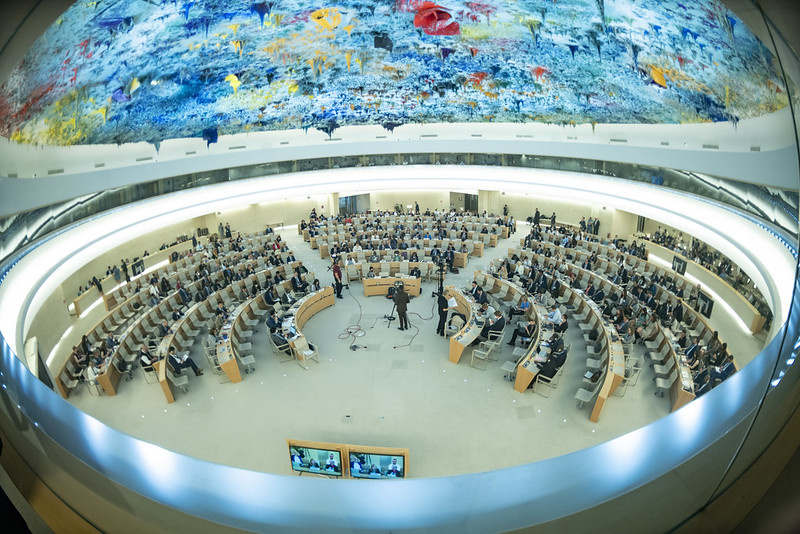
مثال: في 8 أكتوبر/تشرين الأول 2021، اعتمد مجلس حقوق الإنسان التابع للأمم المتحدة القرار 48/13، وهو اتفاقية تاريخية تُقرّ بأن البيئة النظيفة والصحية والمستدامة حقٌّ من حقوق الإنسان. ويحثّ هذا القرار الحكومات على تطوير تشريعاتها الوطنية أو تحسينها، ويدعم عمل جميع المدافعين عن حقوق الإنسان والناشطين البيئيين.
يجوز للمجلس، في قراراته، أن يطلب من المفوضية السامية لحقوق الإنسان تقديم رؤى وتقارير ودراسات حول وضع محدد. كما يجوز له أن يطلب منها تقديم مساعدة فنية إلى بلد ما.
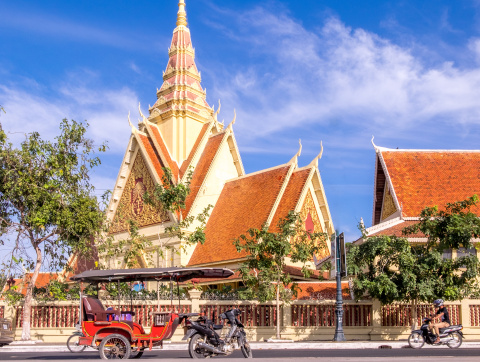
مثال: في قرار صادر في دورته الرابعة والخمسين عام 2023، وبالاتفاق مع حكومة كمبوديا، كلف المجلس الأمم المتحدة بمساعدة كمبوديا في إنشاء آلية وطنية لحقوق الإنسان بهدف تحسين المؤسسات القانونية في البلاد من خلال تدريب القضاة والمحامين وموظفي المحاكم، فضلاً عن كيانات إنفاذ القانون، ومساعدة كمبوديا على قياس تقدمها بشكل أفضل في قضايا حقوق الإنسان.
رصد حالة حقوق الإنسان في جميع أنحاء العالم
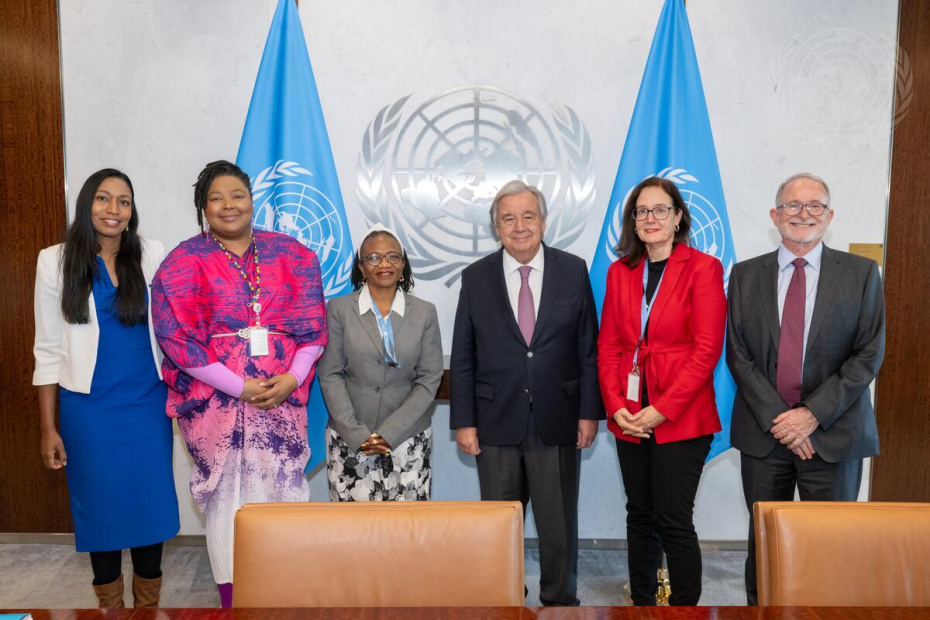
الإجراءات الخاصة
يُعيّن مجلس حقوق الإنسان ما يُسمى أصحاب ولايات الإجراءات الخاصة - وهم خبراء في مجال حقوق الإنسان يعملون على مجال مواضيعي أو إقليمي مُحدد، تتراوح مواضيعه بين المهق وتغير المناخ والمرتزقة والاختفاء القسري. عادةً ما يكون هؤلاء الأفراد أو المجموعات صريحين للغاية بشأن انتهاكات حقوق الإنسان التي تقع ضمن نطاق ولايتهم. ويُدلون بتصريحات عامة، ويزورون البلدان لمراقبة حالة حقوق الإنسان، ويتابعون الحالات الفردية. ويُقدم أصحاب الولايات تقريرًا سنويًا بنتائجهم إلى مجلس حقوق الإنسان، وعند الطلب، إلى الجمعية العامة.
تتلقى هذه المهام دعمًا من الأمم المتحدة، سواءً من حيث توفير الموظفين أو تغطية تكاليف السفر. مع ذلك، لا تُدفع أجور هذه المهام، وأصحابها مستقلون وليسوا موظفين في الأمم المتحدة. وهذا يؤكد حيادهم تجاه أي جهة فاعلة.
مثال: أرمينيا تغير سياستها بشأن إنشاء مجتمعات منفصلة للفقراء والأطفال ذوي الإعاقة
في عام ٢٠١٩، أرسل المقرران الخاصان المعنيان بالإعاقة والتعليم رسالةً إلى أرمينيا بشأن خطط الدولة لدعم بناء ما يُسمى "مدينة كاريتاس" أو "مدينة الأطفال" للأطفال وأسرهم من ذوي الدخل المحدود أو ذوي الإعاقة. وأعرب الخبراء عن مخاوفهم من أن يؤدي ذلك إلى نشوء مجتمعات معزولة. وفي ردها المؤرخ ١٠ فبراير ٢٠٢٠، أبلغت الحكومة المكلفين بالولاية بتراجعها عن قرارها وإيقافها تنفيذ المشروع.
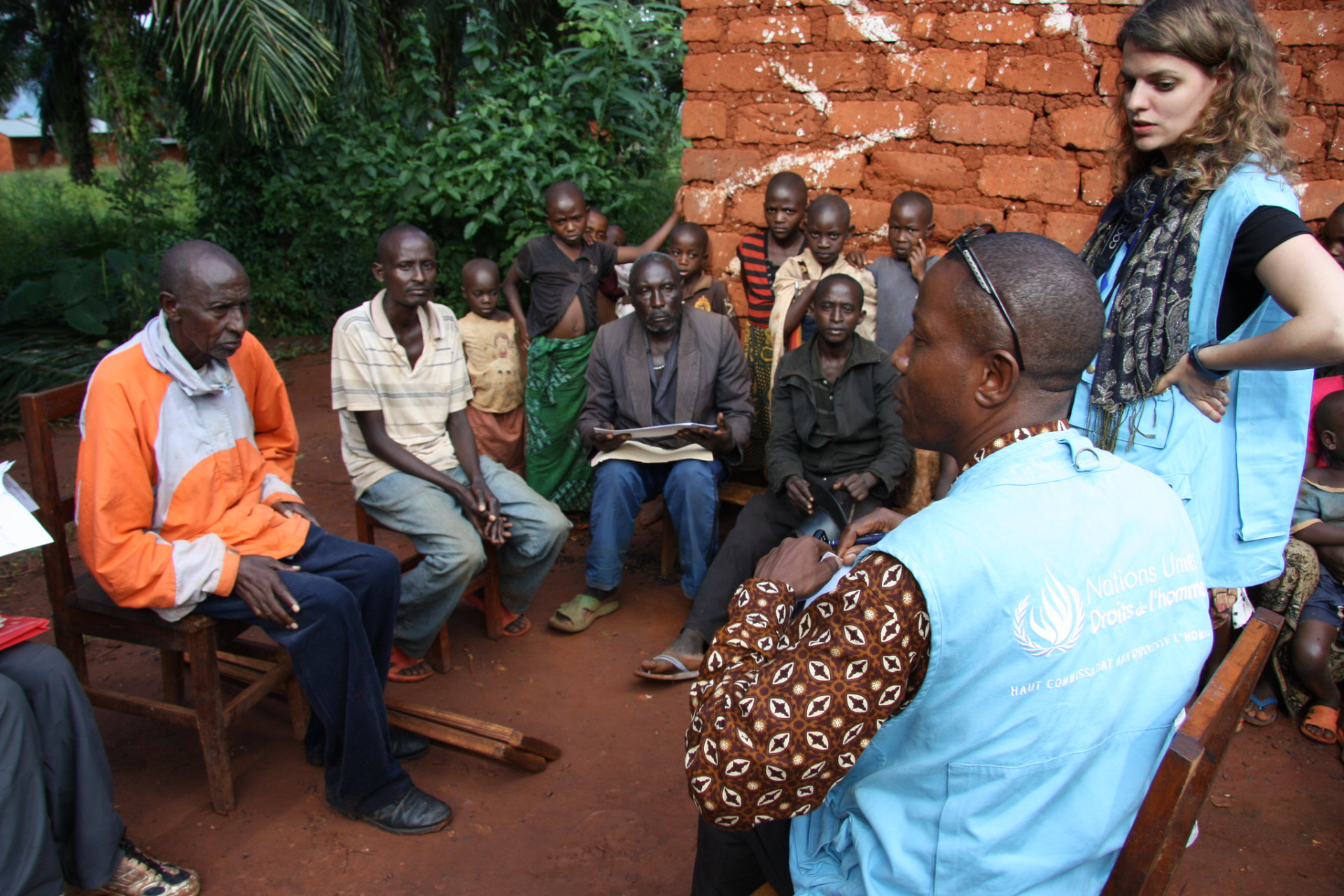
المكاتب المحلية لمفوضية الأمم المتحدة السامية لحقوق الإنسان
لمكتب الأمم المتحدة لحقوق الإنسان حضور عالمي يشمل 12 مكتبًا إقليميًا و18 مكتبًا قطريًا بحلول عام 2024. إضافةً إلى ذلك، يتواجد مكتب المفوضية في العديد من بعثات حفظ السلام، ويُنشر مستشارو حقوق الإنسان في أكثر من 40 فريقًا قطريًا تابعًا للأمم المتحدة. وتتنوع الأنشطة: يتفاعل مسؤولو حقوق الإنسان على المستوى الوطني مع الحكومة والهيئات الوطنية، مثل اللجنة الوطنية لحقوق الإنسان أو منظمات المجتمع المدني؛ ويرصدون حالة حقوق الإنسان ويسجلون الانتهاكات؛ ويحمون الضحايا؛ وينشرون انتهاكات حقوق الإنسان ويُطلعون العالم على قضاياها.
على سبيل المثال: دعم مكتب حقوق الإنسان في وسط أفريقيا بلداناً مختلفة في المنطقة لتقديم تقاريرها المنتظمة إلى هيئات المعاهدات والاستعراض الدوري الشامل وآليات حقوق الإنسان الأخرى: بالنسبة للعديد من الحكومات، فإن القدرة على جمع وتحليل البيانات الشاملة حول وضع حقوق الإنسان هي الخطوة الأولى نحو معالجة المشاكل المحتملة وبالتالي خدمة مواطنيها بشكل أفضل.
كما درّب مكتب وسط أفريقيا العديد من الصحفيين على تغطية قضايا حقوق الإنسان. ونتيجةً لذلك، نُشر أكثر من 180 مقالاً، بالإضافة إلى عشرات التقارير التلفزيونية والإذاعية التي تناولت قضايا حقوق الإنسان. وعلى المدى البعيد، يُساعد هذا المواطنين على فهم حقوقهم وحمايتها بشكل أفضل.
مثال: سيراليون تلغي عقوبة الإعدام
المراجعة الدورية الشاملة
يُعدّ الاستعراض الدوري الشامل نظامًا فريدًا من نوعه داخل الأمم المتحدة، وهو عملية تشاركية بين الدول. وبروح بناءة، تُشيد الحكومات بعضها البعض بإنجازاتها في مجال حقوق الإنسان، وتُقدّم توصيات بشأن ما يُمكن تحسينه. تخضع كل دولة للاستعراض كل أربع سنوات ونصف. وتستند توصيات الدول إلى تقرير وطني، وتحليل من الأمم المتحدة، وتقرير تُعدّه الجهات المعنية، مثل منظمات المجتمع المدني. بعد استلام جميع التوصيات، تُعلن الدولة الخاضعة للاستعراض علنًا عن التوصية التي ستقبلها وتعمل عليها.
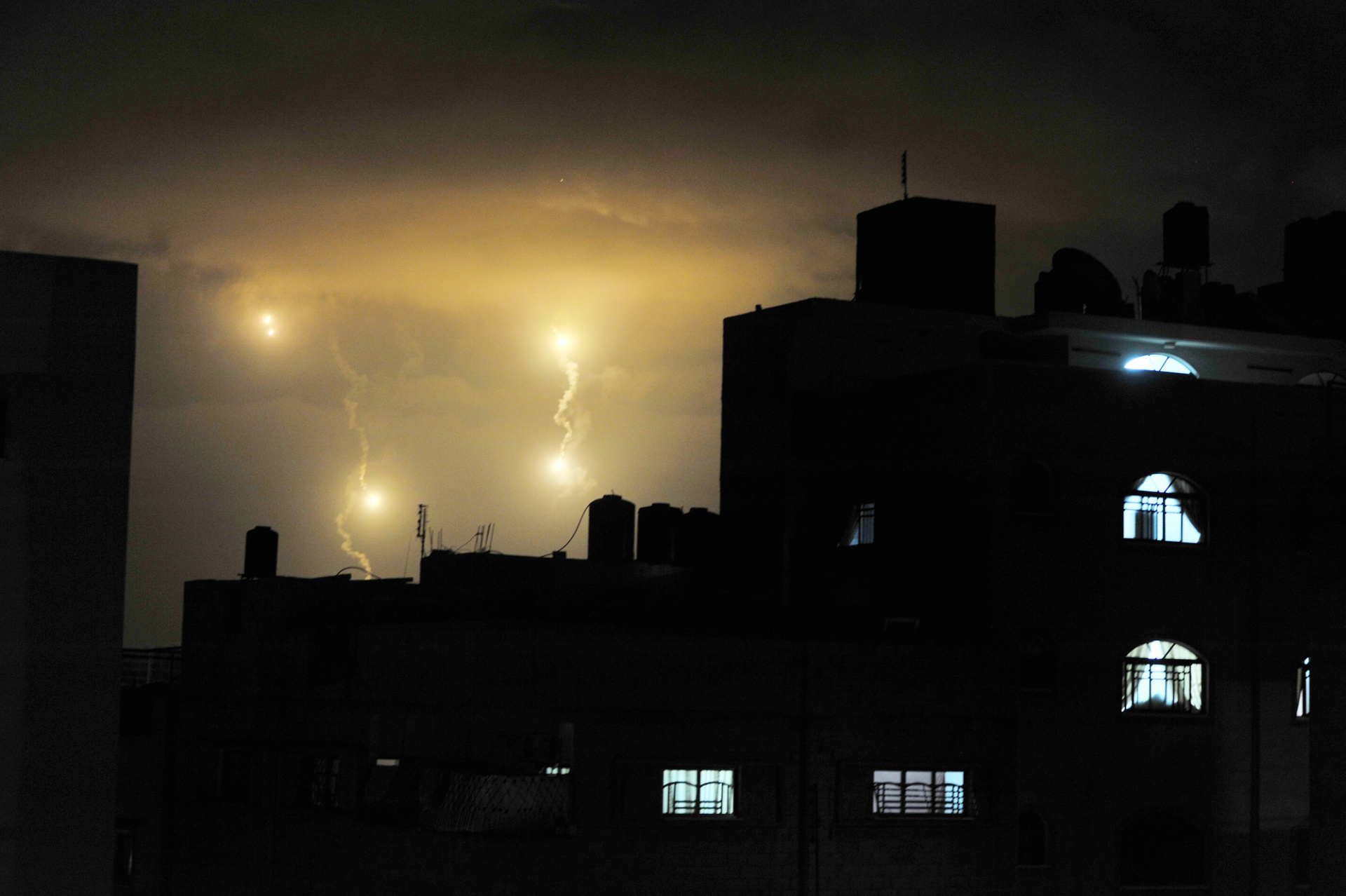
التحقيقات
عندما تنتهك دولةٌ ما حقوق مواطنيها انتهاكًا صارخًا، تُجري الأمم المتحدة تحقيقات. وحاليًا، تُجري مفوضية الأمم المتحدة السامية لحقوق الإنسان، بناءً على طلب مجلس حقوق الإنسان، تحقيقاتٍ في انتهاكات حقوق الإنسان في 13 دولة ، تمتد من فنزويلا إلى بيلاروسيا وسوريا والسودان وميانمار. إضافةً إلى ذلك، يُجرى تحقيقٌ جارٍ حول العدالة العرقية في إنفاذ القانون، وهو تحقيقٌ لا يرتبط بدولةٍ واحدة.
علاوة على ذلك، تم إنشاء آليات التحقيق بشأن سوريا ( IIIM & IIMP) وميانمار ( IIMM ) من قبل الجمعية العامة، وهي تعمل أيضًا من جنيف.
يتحدث المحققون مع الضحايا والشهود، ويحتفظون بسجلات مفصلة للحوادث، بما في ذلك، إن أمكن، أسماء المجرمين الذين ارتكبوا انتهاكات حقوق الإنسان. يمكن استخدام هذه السجلات لمعاقبة دولة ما، أو منح اللجوء، أو دفع تعويضات للضحايا، أو توجيه اتهامات للجناة - إما أمام محكمة دولية، أو في وقت لاحق، بعد إعادة النظام القضائي للحكومات.
مثال: حُكم على مسؤول سوري سابق رفيع المستوى بالسجن المؤبد من قِبل محكمة ألمانية لدوره في التعذيب والقتل والعنف الجنسي ضد الشعب السوري. كان قد طلب اللجوء في ألمانيا، ولكن، جزئيًا بفضل الأدلة التي جمعتها الآلية الدولية المحايدة ، كُشف النقاب عن الفظائع التي ارتكبها.
توضيح: ما هي "المؤسسة المستقلة المعنية بالمفقودين في سوريا"؟
في عام ٢٠٢٣، أصدرت الجمعية العامة للأمم المتحدة قرارًا بإنشاء هيئة مستقلة معنية بالمفقودين في سوريا، مهمتها الكشف عن مصير جميع المفقودين، ودعم أسرهم والناجين منهم. وتشير الأرقام الرسمية إلى أن حوالي ١٠٠ ألف شخص فُقدوا خلال الحرب الأهلية التي عصفت بالبلاد منذ ١٣ عامًا، بينما تُقدر الأرقام الفعلية بأعلى من ذلك بكثير.
ولتنفيذ هذه الآلية الجديدة، قامت المفوضية بتعيين موظفين يتمتعون بخبرة في مجال حقوق الضحايا والأشخاص المفقودين، وسيبدأون عملهم في عام 2024.
العمل في مجال حقوق الإنسان: ما هو أثره؟
مع كل الأخبار السيئة التي نراها، والأزمات التي تبدو متفاقمة يومًا بعد يوم، أليس العمل في مجال حقوق الإنسان مجرد جهد ضائع؟ في الواقع، لا توجد آلية تُلزم الحكومات بالتزاماتها المتعلقة بحقوق الإنسان، مع أن العديد من القوانين والمعاهدات الدولية لحقوق الإنسان مُلزمة قانونًا. ومع ذلك، فإن للعمل في مجال حقوق الإنسان وظائف جوهرية عديدة:
يُسهم عمل مسؤولي حقوق الإنسان في الأمم المتحدة والمنظمات الأخرى في تسليط الضوء على جميع انتهاكات حقوق الإنسان التي تحدث، وغالبًا ما تُشكّل نتائجهم أساسًا للتقارير الإعلامية. لو لم تكن هناك جهات محايدة على الأرض لتسجيل هذه الانتهاكات ونشرها، لكان من السهل إخفاؤها.
إن جمع الأدلة والاحتفاظ بسجل تفصيلي لجميع الحوادث والأشخاص المعنيين أمر ضروري عند مقاضاة مرتكبي هذه الانتهاكات.
تفتقر العديد من الدول إلى المعرفة أو الوسائل اللازمة لتطوير حقوق الإنسان، أو إنفاذ القانون، أو أنظمة المحاكم. لذا، تتدخل الأمم المتحدة، كشريك، لمساعدة الحكومات على تحسين آلياتها، مما يعود بالنفع على المواطنين في نهاية المطاف.
من خلال آليات المراجعة والرقابة، يُسلِّط مكتب حقوق الإنسان التابع للأمم المتحدة الضوء على أوجه القصور في سجلات حقوق الإنسان في الدول. وبالمثل، خلال الاستعراض الدوري الشامل، ضغطت الدول على نظيراتها لتكثيف جهودها لحماية حقوق الإنسان. وقد أثبتت هذه الملاحظات البناءة فعاليتها، إذ تُشير معظم الدول إلى التوصيات التي تلقتها خلال الاستعراض الأخير، وتُبلغ بفخر عن التقدم المُحرز منذ ذلك الحين.
أين يمكن لأي فرد أو منظمة غير حكومية اللجوء عندما تنتهك حكومته حقوقه الإنسانية بشكل ممنهج؟ يدير مكتب حقوق الإنسان عدة آليات شكاوى تتيح للأفراد أو الجماعات الإبلاغ عن حالات تتعارض مع القانون الدولي لحقوق الإنسان. قد تؤدي هذه الشكاوى، بعد فحصها بدقة، إلى إعادة المحاكمات أو دفع تعويضات، أو الإفراج عن السجناء أو تخفيف الأحكام، أو وضع سياسات جديدة تتوافق مع المعايير الدولية لحقوق الإنسان، أو اتخاذ مفوضية الأمم المتحدة السامية لحقوق الإنسان إجراءات إضافية، مثل إجراء تحقيق مستقل، أو تقديم مساعدة فنية، أو تعيين مقرر خاص لمراقبة الوضع.
المنظمات العاملة في مجال حقوق الإنسان
تأسست الآلية الدولية المحايدة والمستقلة - سوريا (IIIM) في ديسمبر 2016 من قبل الجمعية العامة للمساعدة في التحقيق مع الأشخاص المسؤولين عن أخطر الجرائم بموجب القانون الدولي المرتكبة في الجمهورية العربية السورية ومقاضاتهم منذ مارس 2011.
المعهد الدولي للتحكيم الدولي هو ميسّر للعدالة يعمل من أجل المساءلة [...]
في سبتمبر 2018 ، أنشأ مجلس حقوق الإنسان التابع للأمم المتحدة آلية التحقيق المستقلة لميانمار مع تفويض بجمع الأدلة المتعلقة بأخطر الجرائم وانتهاكات القانون الدولي التي ارتكبت في ميانمار منذ عام 2011 وتوحيدها وحفظها وتحليلها. إعداد الملفات من أجل تسهيل وتسريع الإجراءات الجنائية العادلة والمستقلة ، في [...]
المؤسّسة المستقلّة هي كيان تابع للأمم المتحدة أنشأته الجمعيّة العامّة في 29 حزيران 2023 استجابة للنداءات العاجلة من أفراد أسر الآلاف من الأشخاص المفقودين في سوريا لاتخاذ إجراءات لتحديد مصيرهم ومكان وجودهم. ينصّ القرار التأسيسي للمؤسّسة المستقلّة المعنيّة بالمفقودين على ما يلي:
توضيح مصير ومكان وجود [...]
منظمة العمل الدولية هي وكالة الأمم المتحدة لعالم العمل. فهو يجمع بين الحكومات وأصحاب العمل والعمال لدفع نهج محوره الإنسان لمستقبل العمل من خلال خلق فرص العمل ، والحقوق في العمل ، والحماية الاجتماعية والحوار الاجتماعي.
تأسست المنظمة الدولية للهجرة في عام 1951 ، وهي منظمة حكومية دولية رائدة في مجال الهجرة وتعمل بشكل وثيق مع الشركاء الحكوميين والحكوميين الدوليين وغير الحكوميين. تعمل المنظمة الدولية للهجرة على المساعدة في ضمان الإدارة المنظمة والإنسانية للهجرة لتعزيز التعاون الدولي بشأن قضايا الهجرة ، وللمساعدة في [...]
مركز التجارة الدولية هو وكالة مشتركة بين منظمة التجارة العالمية والأمم المتحدة. بصفته شريك التنمية لنجاح تصدير الأعمال الصغيرة ، فإن هدف مركز التجارة الدولية هو مساعدة البلدان النامية والبلدان التي تمر بمرحلة انتقالية على تحقيق التنمية البشرية المستدامة من خلال الصادرات.
تتمثل مهمة مفوضية الأمم المتحدة السامية لحقوق الإنسان (OHCHR) في العمل من أجل حماية جميع حقوق الإنسان لجميع الناس ؛ للمساعدة في تمكين الناس لإعمال حقوقهم ؛ ومساعدة المسؤولين عن دعم هذه الحقوق في ضمان تنفيذها.
في يوليو 2010 ، أنشأت الجمعية العامة للأمم المتحدة هيئة الأمم المتحدة للمرأة ، وهيئة الأمم المتحدة للمساواة بين الجنسين وتمكين المرأة. وبذلك ، اتخذت الدول الأعضاء في الأمم المتحدة خطوة تاريخية في تسريع أهداف المنظمة بشأن المساواة بين الجنسين وتمكين المرأة. جاء إنشاء هيئة الأمم المتحدة للمرأة كجزء من [...]
برنامج الأمم المتحدة للمستوطنات البشرية ، موئل الأمم المتحدة ، هو وكالة الأمم المتحدة للمستوطنات البشرية. تم تفويض من قبل الجمعية العامة للأمم المتحدة لتعزيز البلدات والمدن المستدامة اجتماعيا وبيئيا بهدف توفير المأوى المناسب للجميع.
يقود برنامج الأمم المتحدة المشترك المعني بفيروس نقص المناعة البشرية / الإيدز الجهد العالمي لإنهاء الإيدز باعتباره تهديدًا للصحة العامة بحلول عام 2030 كجزء من أهداف التنمية المستدامة.
منذ أن تم الإبلاغ عن أولى حالات الإصابة بفيروس نقص المناعة البشرية منذ أكثر من 35 عامًا ، أصيب 78 مليون شخص بفيروس [...]
تم إنشاء لجنة الأمم المتحدة الاقتصادية لأوروبا (UNECE) في عام 1947 من قبل المجلس الاقتصادي والاجتماعي. وهي واحدة من خمس لجان إقليمية تابعة للأمم المتحدة. هدفها الرئيسي هو تعزيز التكامل الاقتصادي لعموم أوروبا.
أنشئ مكتب اتصال اليونسكو في جنيف (GLO) في عام 1979 من أجل الاتصال بين اليونسكو ومكتب الأمم المتحدة في جنيف (UNOG)، ووكالات الأمم المتحدة المتخصصة الموجودة هنا (مثل منظمة الصحة العالمية، ومنظمة العمل الدولية، والاتحاد الدولي للاتصالات، والمنظمة العالمية للملكية الفكرية، والمنظمة العالمية للأرصاد [...]
المفوضية السامية للأمم المتحدة لشؤون اللاجئين هي منظمة عالمية مكرسة لإنقاذ الأرواح وحماية الحقوق وبناء مستقبل أفضل للأشخاص الذين أجبروا على الفرار من ديارهم بسبب الصراع والاضطهاد. نقود العمل الدولي لحماية اللاجئين والمجتمعات النازحة قسراً والأشخاص عديمي الجنسية.
نحن نقدم المساعدة المنقذة للحياة ، [...]
تعمل اليونيسف في أصعب الأماكن في العالم للوصول إلى الأطفال والمراهقين الأكثر حرمانًا - ولحماية حقوق كل طفل في كل مكان. في أكثر من 190 دولة وإقليم ، نقوم بكل ما يلزم لمساعدة الأطفال على البقاء والازدهار وتحقيق إمكاناتهم ، من الطفولة المبكرة حتى المراهقة.
أكبر مزود للقاحات في العالم ، نحن ندعم صحة [...]
يُجري معهد الأمم المتحدة لبحوث نزع السلاح (UNIDIR) - وهو معهد مستقل داخل الأمم المتحدة - أبحاثًا حول نزع السلاح والأمن بهدف مساعدة المجتمع الدولي في تفكيره وقراراته وجهوده في مجال نزع السلاح.
يقدم معهد الأمم المتحدة للتدريب والبحث (UNITAR) ، باعتباره ذراع تدريب مخصص لمنظومة الأمم المتحدة ، حلولًا تعليمية مبتكرة للأفراد والمنظمات والمؤسسات لتعزيز صنع القرار العالمي ودعم العمل على المستوى القطري من أجل تشكيل مستقبل أفضل.
تم إنشاء معهد الأمم المتحدة للتدريب والبحث (UNITAR) في عام 1963 [...]
يتمتع مكتب الأمم المتحدة المعني بالمخدرات والجريمة (UNODC) بصلاحية جعل العالم أكثر أمانًا من المخدرات والجريمة المنظمة والفساد والإرهاب. تلتزم المنظمة بتحقيق الصحة والأمن والعدالة للجميع من خلال معالجة هذه التهديدات وتعزيز السلام والرفاهية المستدامة كرادع لها.
يعمل مسؤول الاتصال التابع لمكتب الأمم [...]
معهد الأمم المتحدة لبحوث التنمية الاجتماعية معهد أبحاث مستقل داخل منظومة الأمم المتحدة يقوم بإجراء أبحاث متعددة التخصصات وتحليل للسياسات حول الأبعاد الاجتماعية لقضايا التنمية المعاصرة. يعمل معهد الأمم المتحدة لبحوث التنمية الاجتماعية بشكل تعاوني مع شبكة واسعة من الشركاء من الأوساط الأكاديمية [...]
برنامج الأغذية العالمي للأمم المتحدة هو أكبر منظمة إنسانية في العالم تقوم بإنقاذ الأرواح في حالات الطوارئ وتستخدم المساعدة الغذائية من أجل تمهيد السبيل نحو السلام والاستقرار والازدهار للناس الذين يتعافون من النزاعات والكوارث وآثار تغيّر المناخ.


